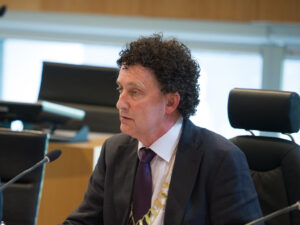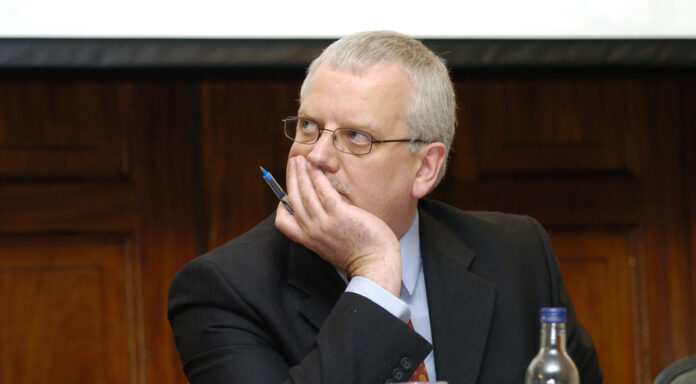Businesses will not benefit from any commercial cut in rates next year, ahead of the new equalisation process in 2016.
Clare’s 2015 Draft Budget was passed at a meeting on Wednesday by 23 votes to three. It was opposed by Fine Gael Councillor Johnny Flynn and Independent Councillors Ian Lynch and James Breen.
The new Annual Rate of Valuation (ARV) was set at €72.99, which is the existing county commercial rate. This proposal was passed by 23 votes to two, following opposition from Councillors Flynn and Lynch, with one abstention.
Following this decision, it seems as if commercial rates in Ennis and Kilrush will have to increase from €65.45 and €61.93, respectively, up to the €72.99 over a five-year period, starting in 2016.
Councillor Johnny Flynn argued there should be plenty of scope to reduce the county commercial rate down to the Ennis rate, considering up to €1 million should have been saved in increased efficiencies, following the abolition of Ennis, Kilrush, Kilkee and Shannon town councils.
Councillor Flynn pointed out up to €200,000 was spent on representation costs for nine Ennis town councillors last year, which is no longer being incurred, while €234,572 was spent in service support costs for 32 county councillors in 2013. With the number of councillors dropping to 28, he argued this figure should be reduced by at least €30,000.

Mayor of Ennis, Johnny Flynn opposed the adoption of the council’s 2015 budget.
A figure of €490,688 in service support costs for 28 councillors was adopted in the budget.
Councillor Flynn’s views were supported by Councillor Lynch, who stated that the savings accruing from the abolition of town councils should be passed on to businesses.
It was also decided that an additional €50,000 will be given to the four municipal districts, at the discretion of councillors in these districts, in 2015.
Mr Coughlan had proposed to councillors that ratepayers will pay the same rates in 2015 as they did in 2014, which will ensure no relief for traders, who are still struggling after years of austerity.
With the total number of council employees standing at 837 at the end of September, Mr Coughlan also expects the overall staff complement will continue to reduce next year, as further retirements occur.
The council’s chief executive officer has signalled rates income in 2015 will only reduce slightly, by €100,000, by the amount of the rates that previously applied to the former town commissioner areas.
Next year will also mark the start of the harmonisation of rates between the previous town council and county council areas within the new single rating authority area.
The adjustment process, which may take up to a maximum of 10 years to complete, is referred to as the Base Year Adjustment (BYA) mechanism.
The effect of the BYA in every local authority will be to neutralise any increase or decrease in rates in 2015 that would otherwise occur as a result of the rate struck by the members for the amalgamated authority as a whole.
It is expected the overall rates income for 2015 is €42.4 million, of which 85% relates to the former county area, while 15% relates to the previous town council areas.
Mr Coughlan confirmed the ARV harmonisation adjustment would be addressed on a phased basis in the annual budgeting processes, from 2016 onwards, until harmonisation is achieved.
However, he also noted the 2014 Local Government Reform Act did amend the legislation in relation to rates refunds, so that a local authority may decide a revised refund proportion may apply in respect of vacant properties. Currently, in all areas of the county, a 100% refund applies for properties that are vacant for the full year.
Provision has been made in the budget for ongoing increasing levels of refunds and irrecoverable rates to reflect the current experience in this area.
While the council has to make every effort to collect the income that is due, Mr Coughlan stated the authority would continue to engage with ratepayers who are experiencing genuine difficulty as a result of the economic downturn.
“The preparation of Budget 2015 has been challenging because of a number of factors, including the changes in the overall budgeting process, resource constraints and significant changes in operations, which are being implemented.
“The necessity to drive the efficiency agenda and to deliver services with decreasing resources is also challenging and the organisation must develop a structure which maximises overall effectiveness and efficiency, utilising resources to achieve optimum productivity, outputs and incomes. Significant progress has been made in 2014 in this regard and this process will continue in 2015,” he stated.
The budget has been prepared on the basis that road grant allocations in 2015 will be in line with the initial 2014 allocations. However, the council still has not been notified about its 2015 road allocations.
A native of Ennis, Colin McGann has been editor of The Clare Champion since August 2020. Former editor of The Clare People, he is a journalism and communications graduate of Dublin Institute of Technology.



